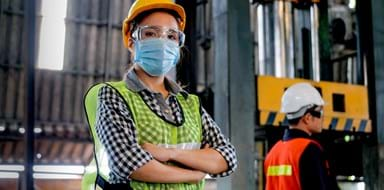
A brewery specialising in gluten free beer has improved efficiency, productivity, and profitability after investing in process control and automation technologies.
Brightside Brewing Company, in Greater Manchester, engaged with Made Smarter in a bid to solve long-standing challenges caused by outsourcing its kegging operations.
The Radcliffe-based business has now established an in-house kegging plant, which is enabling growth and innovation opportunities.
Brightside Brewing Company, based in Radcliffe, is a family-run brewery established in 2009.
When brewing started 15 years ago, the business was a full-on family affair, but these days sister and brother Carley and Lance Friedrich are increasingly in control, with parents Neil and Maxine gradually stepping back.
The business produces upwards of 1.1m pints of gluten free beer and lager in cask, keg, bottle and cans per year, supplying its range of around 30 products directly to trade, ecommerce and retail, including 35 Brunning and Price sites in the North.
Brightside engaged with Made Smarter in 2022 and kick-started its journey with a digital transformation workshop, a process which analysed its product, process and people. The discussion identified that growth was being stifled with the reliance on subcontractors for kegging, which makes up about 30% of revenue.
Carley Friedrich, Director, said: “As the business grew and we started to keg our beers, outsourcing became a vital part of our operation. We were sending our beers and lagers to a plant halfway across the country to be filled and packaged for sale, and then returned to us. This service became increasingly costly and the root of numerous operational headaches.
“Bringing operations in-house would secure supply, increase control, increase quality, reduce waste and improve profitability.”
Supported by a £20,000 grant from Made Smarter, the brewery invested £80,000 in equipment to establish an in-house kegging plant.
The solution includes a carbonation machine and buffer tank, dual filter filtration skid, and keg washer and filler.
At the heart of the operation are process control and automation technologies which manage the flow of product from the tank to the keg.
Sensors and flow meters ensure the correct temperature, pressure and carbonation levels are controlled, adjusting levels and speed as required. This ensures the finished keg is completely full and wastage is kept to a minimum.
The equipment also automatically washes and sterilises the kegs before they are filled.
Brightside began trialling the new solution at the beginning of 2024 and in the first six months has so far brought in-house 70% of its overall kegging.
The new, more efficient process has increased yields by 10%.
Automation has enabled an immediate improvement in quality, less wasted beer, and a higher level of customer satisfaction.
Bringing the operation in-house is forecast to save the business tens of thousands of pounds per year in subcontract costs. This has enabled Brightside to offer its keg products at a more competitive price in the market and tender to larger, national enterprises.
Kegging beers and lagers in-house will also enable the business to do shorter runs of seasonal products, and therefore offer a wider range to customers, experiment with new ideas, and reduce stock holding.
Four members of staff have been trained to operate the new technology giving the business new skills and flexibility. Growth will inevitably lead to new jobs.
The technology has also reduced Brightside’s carbon footprint by 22 tonnes of CO2e each year through the elimination of transport and plastic packaging.
Carley said: "The grant we received towards our kegging equipment has undoubtedly been a game-changer. This investment gives us more control over a process which was previously totally outsourced, thereby providing more stability and autonomy for the business, increasing profitability and also upskilling our brewery team."
With ambitions to grow and move into larger premises over the next few years, the family is on a journey of continuous improvement, exploring new technologies as and when they are needed.
Carley added: “We've extremely grateful for the help, support and training we've received by working with Made Smarter. It's helped us take a critical look at our business' digital needs, understand how to improve on weaknesses that were found as well as how to capitalise upon existing strengths.”








